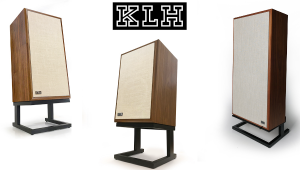Will you please stop with the "vinyl is better than CD" crap, please? What kind of rarified existence did you people live in during the era of vinyl records? Did you all have $2500 turntables, $1500 tonearms and $500 diamond cartridges? Unfortunately, the rest of us were stuck with crummy street asphalt pressings of second or third generation masters tapes. Unless you paid 4-5 times more for an MFSL limited edition, that's what you usually got. To me, CDs were a godsend. If you want to criticize lo-res compression formats like mp3, wma, or Apple, that's fine, but please don't keep pushing the lie that vinyl is sonically superior to digital CD.
Benmont Tench Breaks Down Why He Loves Vinyl

Mike Mettler: What was your sonic goal for the vinyl version of You Should Be So Lucky?
Benmont Tench: I wanted it to sound like the tape. I mean, it’s Glyn Johns producing! So we recorded to tape, no Pro Tools. The first hint of digital media was when it was mastered to CD. I just want people to hear it as close to the tape as possible. Chris Bellman did the vinyl mastering, and it sounds fantastic. It was important for me that we got the details across to those who would appreciate it. For example, at the beginning of the very first track, “Today I Took Your Picture Down,” there’s some air in the way the sticks drop onto the snare that’s just lovely.
Mettler: To me, that song has a modern, Southern Accents kind of feel to it.
Tench: Oh, nice. We didn’t think about it; we just started playing. I don’t know what Glyn said to the other musicians, but he encouraged me to play the song and not tell other people what to play &mdash which was fine by me, because they’re all my friends. I love playing with them, and I learn something new every time. And it’s a live track. The vocal is live, and nobody punched anything in.
Mettler: And you recorded the band live off the floor, too. Me, I happen to like hearing bleedthrough. When something reverberates off of a snare drum because you’re right there in the room with it, that’s as real as it gets.
Tench: Exactly! You get the blending of the soundwaves of the two guitars mixing in with each other. And sometimes you get the vocal sound and piano sound on one mike, like we did on “Duquesne Whistle” and “Hannah.” Because I sing so quietly, they had to turn the mike up really loud, so we got the piano in the vocal mike. At one point on “Duquesne,” I asked Glyn, “Can I re-sing that one line?” and he said, “No, dear boy, you can’t. It can’t be done. No way.” [both laugh]
Mettler: I’m glad Lucky is spread out over four sides — and it has two bonus tracks, too. The side breaks are important for feeling the mood shifts on this record.
Tench: All I listen to are LPs, so it’s important to me to have the sides. You listen to four or five songs at a time; that’s a good chunk of music. Sides have their own character. And you can have a favorite side of an album, like we do with Exile on Main Street or The White Album.
Mettler: What kind of turntable do you have?
Tench: It’s a Pro-Ject model, one from the RM Series, the 5.1 SE, and I have the Blue Point No. 2 cartridge. It sounds like a million bucks. Steve Ferrone [drummer with the Heartbreakers] gave me some JBL 4408A studio monitor speakers to go with them. I’m old school. I haven’t gone surround yet. I’m sticking with stereo.
Mettler: What are some of your favorite albums to spin?
Tench: I love records that Bob Dylan made, especially the early funny ones. [both laugh] I really love John Wesley Harding. The one thing I know about Bob Dylan is that it’s a fool’s game trying to figure out Bob Dylan. I’ve learned that first hand. You think he’s saying something clever, and you find out he’s just telling the truth. But that’s what appeals to me about making music, you know?
Mettler: I do. The vinyl reissue of John Wesley Harding is so beautifully stark.
Tench: I don’t have the reissue because I have a really good original.
Mettler: You should get it. And get the Mobile Fidelity remaster of Blonde on Blonde too — it’s soooo good.
Tench: Oh good, it’s by Mobile Fidelity. I don’t trust most reissues unless they specifically say they’re from the analog tapes; a lot of them are done from a digital source. I think you get more of the original signal on vinyl than you do on a 16-bit CD anyway. Vinyl is still the better way to listen, even if the album was originally recorded digitally. I’ve never woken up and gotten lost in the music by listening to a CD. I dig the CD format a lot, but it doesn’t lead me down a rabbit hole like vinyl does. There’s something with the vinyl experience that just draws you in where you can taste it.
Mettler: Any particular record that takes you away every time?
Tench: Oh yeah: Beggars Banquet, Black and Blue... I could go on and on. My thought is, if you’re not listening to vinyl, you’re kind of cheating yourself. I know people have different tastes, and some people really like the sound of digital. MP3s are great for convenience when you travel, but that’s just about it. You’re cheated out of a lot of warmth and richness of any recording. MP3s are better than not listening to music at all, but still — you’re being cheated.
Mettler: Hard to argue with you on that. Considering the way Lucky was essentially cut live in the studio, do you subscribe to the “less is more” theory of recording?
Tench: Denny Cordell [the late producer and co-founder of Tom Petty’s first label, Shelter Records] told me a long time ago the reason some records sound so loud is because there’s less on them. And that makes me think of one of my favorite Heartbreakers songs, “Breakdown.” It has three guitars on it, but the essence of the record is Mike [Campbell]’s guitar lick, Tom [Petty]’s vocals, a solitary Wurlitzer, bass, and drums. It’s a very spare drum pattern. But when it comes on the radio, it catches your ear. It’s really got a lot of space. I think that’s the mark of a really good-sounding record.
An extended version of this interview appears on Mike Mettler’s own site, soundbard.com.
- Log in or register to post comments


It's more than being a luddite, records sound amazing and one doesn't need an audiophile rig to appreciate them. A $400 Pro-Ject and a decent preamp will be more than enough to dissuade the average digital devotee.






























































